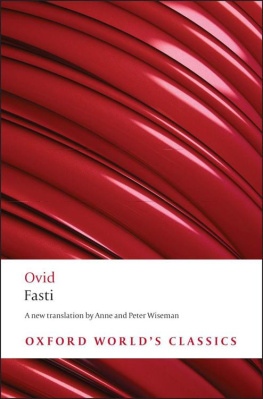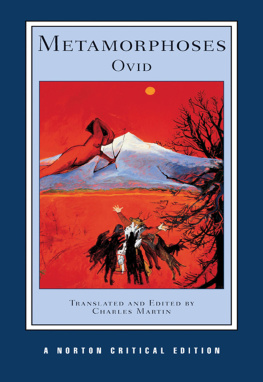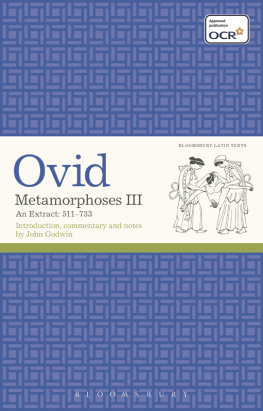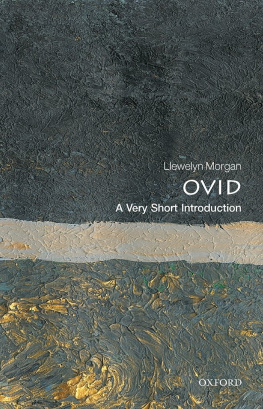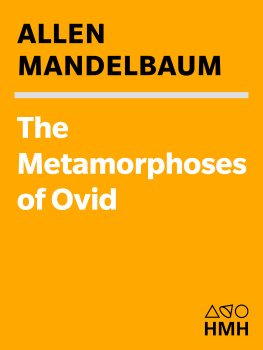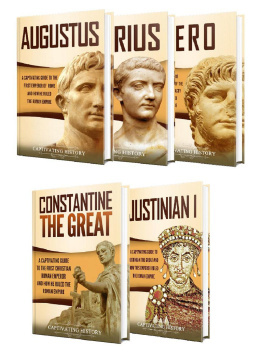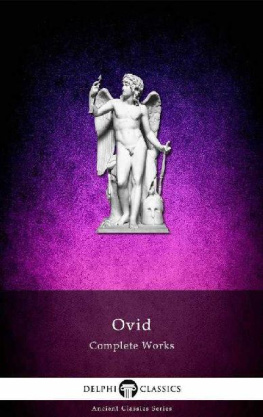
Great Clarendon Street, Oxford, OX 2 6 DP
United Kingdom
Oxford University Press is a department of the University of Oxford.
It furthers the Universitys objective of excellence in research, scholarship,
and education by publishing worldwide. Oxford is a registered trade mark of
Oxford University Press in the UK and in certain other countries
Anne Wiseman and Peter Wiseman 2011
The moral rights of the author have been asserted
First published 2011 as Ovid: Times and Reasons
First published as an Oxford Worlds Classics paperback 2013
Impression: 1
All rights reserved. No part of this publication may be reproduced, stored in
a retrieval system, or transmitted, in any form or by any means, without the
prior permission in writing of Oxford University Press, or as expressly permitted
by law, by licence or under terms agreed with the appropriate reprographics
rights organization. Enquiries concerning reproduction outside the scope of the
above should be sent to the Rights Department, Oxford University Press, at the
address above
You must not circulate this work in any other form
and you must impose this same condition on any acquirer
British Library Cataloguing in Publication Data
Data available
ISBN 9780192824110
Printed in Great Britain by
Clays Ltd, St Ives plc
OXFORD WORLDS CLASSICS
For over 100 years Oxford Worlds Classics have brought readers closer to the worlds great literature. Now with over 700 titlesfrom the 4,000-year-old myths of Mesopotamia to the twentieth centurys greatest novelsthe series makes available lesser-known as well as celebrated writing.
The pocket-sized hardbacks of the early years contained introductions by Virginia Woolf, T. S. Eliot, Graham Greene, and other literary figures which enriched the experience of reading. Today the series is recognized for its fine scholarship and reliability in texts that span world literature, drama and poetry, religion, philosophy, and politics. Each edition includes perceptive commentary and essential background information to meet the changing needs of readers.
Refer to the to navigate through the material in this Oxford Worlds Classics ebook. Use the asterisks (*) throughout the text to access the hyperlinked Explanatory Notes.
OXFORD WORLDS CLASSICS

OVID
Fasti

Translated with an Introduction and Notes by
ANNE AND PETER WISEMAN

OXFORD WORLDS CLASSICS
FASTI
P UBLIUS O VIDIUS N ASO (43 BC AD 17)known to Chaucer as Venus clerk Ovyde and to Touchstone in As You Like It as the most capricious poet, honest Ovidwas born in Sulmo (modern Sulmona) in the central highlands of Italy. He came to Rome in his teens, soon after the defeat of Antony and Cleopatra and the annexation of Egypt had brought about peace and prosperity and the rule of Caesar Augustus. Giving up his original ambition to enter public life, he soon became the sophisticated citys favourite poet. His subject was sex and love and the pursuit of pleasure, and his medium was the elegiac couplet, of which his mastery was unparalleled. Between about 25 BC and the turn of the millennium he wrote Amores (pseudo-autobiographical adventures of the poet as lover), Heroides (letters from love-lorn mythological ladies) and the didactic Art of Love and Remedies for Love, varying the elegiac output with a tragedy, Medea (now lost). Augustus disapproved of the Art of Love, and Ovid turned to more serious subjects, a great mythological epic (Metamorphoses) that went from the creation of the world down to his own times, and a myth-historical treatment of the Roman calendar in elegiacs (Fasti). His celebrity life did him no good: in AD 8 he was involved in a scandal, probably involving Augustus family, and was banished to the outpost of Tomis on the Black Sea (modern Constana in Romania). He continued writing (Tristia, Letters from Pontus), and outlived Augustus, but there was no recall. He died in exile.
A NNE W ISEMAN taught Latin in the Exeter University Department of Classics after her retirement from school teaching.
P ETER W ISEMAN is Emeritus Professor of Classics, University of Exeter, and a Fellow of the British Academy.
CONTENTS
For Barbara Levick
magistrae discipula
19571961
Teacher and prophet
O VIDS calendar poem, Fasti, advertises itself in the first couplet as a source of information:
Tempora cum causis Latium digesta per annum
lapsaque sub terras ortaque signa canam.
Times and their reasons, arranged in order through the Latin year, and constellations sunk beneath the earth and risen, I shall sing.
It is (among other things) a didactic poem addressed to an unnamed pupil: the narrator constantly speaks to you in the singular. In book 1 (a special case) you may be Germanicus Caesar, but otherwise you are the reader with the book in your hand, or the listener having it read to you.
It is assumed that you have an interest in history, and can even carry out your own research: if you have time, your instructor suggests, look up the calendars of other cities ().
You look at the night sky (e.g. ).
So far, so intelligible. But the poem also has a quite different dimension.
The narrator describes himself as a uates (e.g.
Two generations before Ovids time the Romans had begun to use the term uates metaphorically, to mean inspired poet. That applied most characteristically to epic, where ever since Homer the poet had appealed to the Muse to sing the song through him, but poets in other genres used the term as well, including Ovid himself in his youthful Amores.12), explaining the rituals owed to the gods, and so he makes his identity as a uates more than just a metaphor.
Twice he makes the point that the uates has privileged access to the gods (4). And so the narrator is able to report face-to-face interviews with several divinities: Janus in book 1, terrifying but genial; Mars in book 3, macho but ill at ease; Venus in book 4, an old friend ironically teasing; Flora in book 5, ingenuous and very fanciable; and in book 6 a trio of goddesses quarrelling among themselves.
6), the gods can tell him what he needs to know.
For a poet to pray to the Muses for inspiration is commonplace enough. Our narrator prays to Carmentis, the goddess of prophetic song (), and may have their own agendas.
Subject and metre
What is it all about? Tempora cum causis, times and their reasons. That is a striking formulation, since chronology and causation are two of the defining characteristics of history writing. As Cicero observed, the genre of historiography demanded the ordering of times and explanation of reasons. This is something we shall come back to, but in the meantime, are we to think of Times and Reasons as the title of the poem?
Certainly the opening phrase of a work could be regarded as its title, as Ovid himself demonstrates in Tristia, book 2, where he cites Lucretius poem as
Next page
